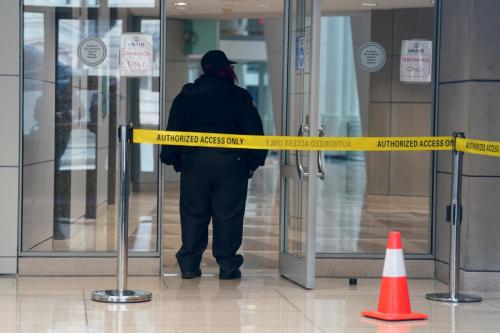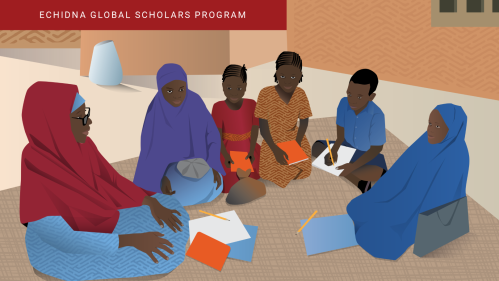The Syrian war and refugee crisis enter their fourth year tomorrow. Since the war started in 2011, the humanitarian community, host countries and advocates have been working fervently to garner attention and resources and to save lives and deliver services.
Three full years have passed and within the education field many of these same actors are asking themselves: What have we learned? How can we do better with limited resources? What is the role of innovation and technology? What can be learned and applied from other refugee contexts?
These questions were the basis for a February roundtable discussion held by the Center for Universal Education at Brookings. The discussion focused on identifying research priorities that could help improve the education crisis facing Syrian refugees. Dina Craissati of the United Nations Children’s Fund presented on the status of the global humanitarian response. Feda Gharaibeh of Jordan’s Ministry of Planning and International Cooperation discussed her country’s humanitarian response and needs. Justin van Fleet of the Office of the Special Envoy for Global Education discussed Lebanon’s plan for educating Syrian refugees and the special envoy’s work to promote that plan. And Ita Sheehy of the United Nations High Commissioner for Refugees highlighted several research priorities.
These presentations and the discussion that followed highlighted the importance of research that accompanies and supports the humanitarian response. A list of six research priority areas emerged based on comments roundtable participants, but these do not necessarily represent a consensus from all participants.
- Push and pull factors keeping children out of school. Efforts to provide access to education should be accompanied with research on various factors keeping children out of school, such as protection issues, livelihood issues and factors causing children to work.
- Non-formal education. Non-formal opportunities are a critical part of the response that can receive more attention, especially if there is a vision for how non-formal education is certified and valued. How are countries thinking about the non-formal response? How are communities being prepared for a range of educational opportunities? What can be learned from other countries experiences, such as Afghanistan and Ethiopia, where non-formal education and home-based schooling is an important part of the education system?
- The role of the Syrian teacher, few of whom are formally teaching. Are there lessons from Palestine refugee response or other models that can inform the role of the Syrian teachers? How can Syrian teachers be supported to keep up their skills so that they are able to teach when they eventually return to Syria?
- In-classroom experiences – teaching and learning. Syrian refugee students have different life experiences, different educational experiences and sometimes different language skills than students in host countries. Meanwhile, teachers in host countries are often asked to teach large classrooms, to take on double shifts of students and to cater to students with different backgrounds. How can teachers be prepared to manage these challenges? These and many other factors affect the quality of learning. There is interest to consider how rapid assessments, including those that involve the community, can be applied in this context, both to measure learning and to garner participation from communities.
- Gender implications in and out of school. Understanding that early marriage, gender-based violence and trafficking are issues, more research is required to understand education’s role in protecting girls, taking into account that Syrian girls in formal and non-formal educational programs may be overage and therefore at even greater risk. What is the role of male and female teachers in protecting students? Male youth face gendered challenges as well, including child labor. These challenges should be understood so they can be addressed.
- Technology – interest and a caveat. The group expressed interest in sharing knowledge about innovations related to technology, recognizing the potential to reach more children through digital curriculum, open education resources and other innovations. However, some participants noted that the intersection of online education and psychosocial support should be studied, given that children have needs that cannot be addressed where there is little or no human interaction. A teacher is more likely to note psychosocial needs and to support children’s recovery, or to refer children to other services when they are in greater contact with children.
Research priorities were offered with the caution that research conducted among refugee children should consider children as participants in research, rather than objects or subjects of research. Research projects that are more focused in nature, and focused on fewer individuals, place greater emphasis on the individual experience. All projects should consider the impact of questioning children and the nature of the questions being asked. The group also shared the conviction that research within the community should be shared freely and in a time-sensitive manner so that programming and policy can benefit, and that the field will benefit from collaboration around topics such as those mentioned above. Brookings’ Center for Universal Education is exploring research on in-classroom experiences, gender and technology.
The Brookings Institution is committed to quality, independence, and impact.
We are supported by a diverse array of funders. In line with our values and policies, each Brookings publication represents the sole views of its author(s).




Commentary
A Fourth Year of War in Syria: What We Still Need to Know About Educating Refugees
March 14, 2014